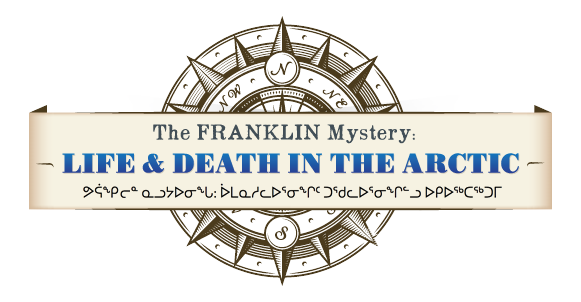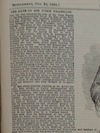The Fate of Sir John Franklin (1854)
Supplement, Oct. 28, 1854.
The veil that obscured the fate of Sir John Franklin has been unexpectantly lifted. Dr. Rae, of the Hudson's Bay Company, has reached England, bringing with him from the Arctic Seas a number of articles that belonged to Sir John Franklin and his companions. The story of recovery of these memorials is most painfully interesting. Dr. Rae's account - which may, of course, be implicitly relied upon - is this: - In the spring he fell in with a party of Esquimaux, who were in possession of a number of articles known to belong to Sir John Franklin himself, and other things, the property of other members of his party. These articles included, amongst the rest, some silver plate bearing the crests of the owners. When the Esquimaux were questioned as to the way in which they had become possessed of such valuables belonging to the officers of the Royal Navy of England, they said that the vessels of Franklin had been crushed in the icebergs, and their crew forced to set out over the snow on their way towards the territories of the Hudson's Bay Company - that in 1850 the Esquimaux had met forty Englishmen belonging to Sir John Franklin's ships travelling on foot, and dragging a boat over the ice, near King William's Land ; that the officer in command of these unfortunates had bought from the Esquimaux for his followers a small seal, being greatly in want of provisions ; that at a later period the Esquimaux found the dead bodies of all this party on the ice near Back River ; and that the Esquimaux helped themselves to the stores of the dead - taking gunpowder, silver, plate, and whatever else they thought fit to appropriate.
Dr. Rae, whose previous exploits as an Arctic traveller, have already so highly distinguished him, landed at Deal on Sunday, and immediately proceeded to the Admiralty, and laid before Sir James Graham the melancholy evidence on which his report is founded. Dr. Rae was not employed in searching for Sir John Franklin, but in completing his survey of the coast of Boothia. He justly thought, however, that the information he had obtained greatly outweighed the importance of his survey, and he has hurried home to satisfy the public anxiety as to the fate of the long-lost expedition, and to prevent the risk of any more lives in a fruitless search. It would seem from his description of the place in which the bodies were found, that both Sir James Ross and Lieutenant Bellot must have been within a few miles of the spot to which our unfortunate countrymen had struggled on in their desperate march. A few of the unfortunate men must, he thinks, have survived until the arrival of the wildfowl, about the end of May, 1850, as shots were heard, and fresh bones and feathers of geese were noticed, near the scene of the sad event.



